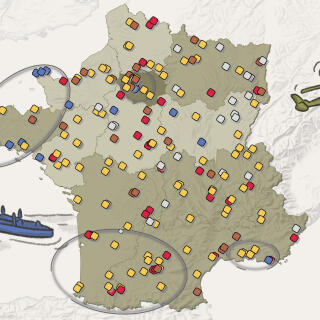"War economy!" The expression had disappeared from France since World War I, when the nation was mobilized – including women in the factories – to supply the armies engaged in an all-out confrontation with Germany. President Emmanuel Macron brought it back into fashion in June 2022, at the Eurosatory land armaments show, almost four months after Russia's invasion of Ukraine. "An economy," said the president, "in which we'll have to move faster, think differently about rhythms, ramp-ups and margins," to manufacture the equipment essential to France and its allies.
Two years after the presidential injunction, France has not strictly speaking entered a "war economy," which requires a general mobilization of the productive apparatus, requisitions of manpower and a substantial reallocation of the national budget to the armed forces. By this yardstick, only Russia and Ukraine, since 2022, and Israel, after the terrorist attack of October 7, 2023, have entered into a war economy, said Sylvain Bersinger, chief economist at Asterès, in a note published at the end of March.
Nonetheless, the mobilization took a step forward on April 26, at least in terms of discourse. Defense Minister Sébastien Lecornu said he was considering "requisitions" of employees, stocks and production tools if industrial groups didn't move fast enough, with companies with both civilian and military activities then ordered to prioritize defense. While this is not the last resort, part of France's defense industrial and technological base (DITB) has stepped up production in response to an upheaval that goes far beyond Ukraine.
Reclaiming lost sovereignty
"We are on the verge of a lasting geopolitical shift, in which the defense industry will play an increasingly important role. We need to go fast, strong and mass-market," said Macron on April 11, as he laid the foundation stone of an extension to the Eurenco plant in Bergerac, southwestern France. The public group's new line, which will relocate production of artillery powders from Sweden, Germany and Italy, is highly symbolic.
According to Macron, the case of Eurenco, the European leader in powders and explosives – materials in short supply – illustrates a company's ability to work in war economy mode and regain lost sovereignty. The site will begin production in 2025, less than two years after the relocation was announced.
It's "a feat," according to its CEO, Thierry Francou, recalling that it usually takes four to five years. From 200 employees in 2022, the company will grow to 450 in 2025, and plans a total investment of €500 million, half of which will be in France. The Elysée Palace reports that the French government is supporting around 20 relocation projects.
You have 69.22% of this article left to read. The rest is for subscribers only.


